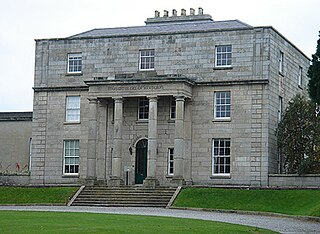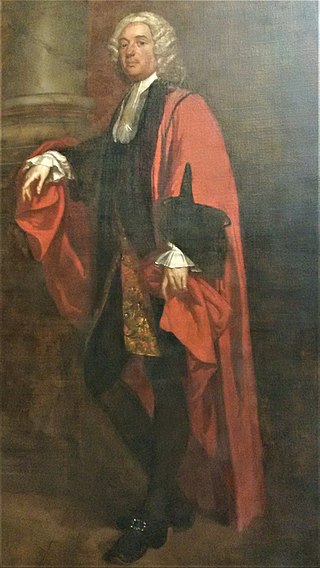
General Sir Richard Bourke, KCB, was an Irish soldier, who served in the British Army and was Governor of New South Wales from 1831 to 1837. As a lifelong Whig (Liberal), he encouraged the emancipation of convicts and helped bring forward the ending of penal transportation to Australia. In this, he faced strong opposition from the landlord establishment and its press. He approved a new settlement on the Yarra River, and named it Melbourne, in honour of the incumbent British prime minister, Lord Melbourne.

Richard Moore PC was an Irish lawyer and judge.
This is a list of lawyers who held the rank of serjeant-at-law at the Bar of Ireland.
Arthur Blennerhassett KC was an Anglo-Irish lawyer, politician and judge. He is remembered mainly for killing John St. Leger in a duel.
Edward Pennefather PC, KC was an Irish barrister, Law Officer and judge of the Victorian era, who held office as Lord Chief Justice of Ireland.
Sir Richard Ryves (1643–1693) was a seventeenth-century Irish judge who served for several years as Recorder of Dublin, and subsequently as a Baron of the Exchequer.
The Law Adviser to the Lord Lieutenant of Ireland was a Law Officer of the English Crown in nineteenth-century Ireland. The office lapsed in the 1880s, due apparently to concerns that it was becoming too political, but was briefly revived in the early twentieth century. It was abolished on the establishment of the Irish Free State in 1922.
Sir Theobald (Toby) Butler (1650–1721) was a leading barrister and politician in late seventeenth-century Ireland, who held office as Solicitor General for Ireland. He is mainly remembered for framing the civil articles of the Treaty of Limerick, and for his eloquent but unsuccessful plea to the Irish House of Commons against the passing of the Popery Act of 1703, which allowed any Protestant son of a Roman Catholic landowner to prevent his Catholic brothers from inheriting the family property. He was a much loved "character" in Dublin, and his great popularity shielded him from the penalties that he might otherwise have suffered as a result of his religious beliefs. Only his few enemies attacked him for his willingness to come to an accommodation with the new regime in order to preserve his own property.
Sir John Meade, 1st Baronet (1642–1707) was an Irish barrister, judge and politician. He was the first of the Meade Baronets of Balintubber, and an ancestor of the Earls of Clanwilliam. He was unusual among the lawyers of his time for his lack of ambition to become a judge of the High Court, despite being generally regarded as a barrister of "excellent parts (qualities)". In matters of religion, he seems to have been, by the standards of his time, a man of very tolerant views: although he was himself a Protestant, he damaged his career by marrying Elizabeth Butler, who was a Roman Catholic, as his third wife.
Sir John Lyndon was an Irish judge and politician of the seventeenth century. He was the first holder of the office of Third Serjeant-at-law, which was created especially for him, apparently as a "consolation prize" for not being made a High Court judge the first time he sought that office.

Sir James Chatterton, 1st Baronet, was an Irish lawyer and politician, and the first of the Chatterton Baronets of Castle Mahon.
Attiwell Wood (1728-1784) was an Irish politician, barrister and Law Officer of the eighteenth century.

Eaton Stannard (1685–1755) was a leading politician and lawyer in 18th-century Ireland. He was a popular Recorder of Dublin, a very unpopular serjeant-at-law (Ireland), and an experienced parliamentarian who represented Midleton in the Irish House of Commons for many years. He is mainly remembered now as a close friend of Jonathan Swift, whose last known letter was written to him.

Henry Purdon was an Irish barrister, politician and Law Officer of the early eighteenth century. He sat in the Irish House of Commons and held the Crown office of Third Serjeant.
Richard Benson Warren (1784-1848) was an Irish barrister and Law Officer who held the position of Serjeant-at-law (Ireland).
Robert Dixon (1685-1732) was an Irish barrister, judge and politician who served very briefly as a justice of the Court of Common Pleas (Ireland).
Richard Malone (1706–1759) was an Irish barrister and politician. He held the office of Serjeant-at-law and sat for many years in the Irish House of Commons as member for Fore.
Richard Keatinge (1793-1876) was an Irish barrister and judge who served for many years as the Irish Probate judge. He and his wife Harriet Augusta Joseph has a number of distinguished descendants, including an eminent scientist, a famous novelist and a recipient of the Victoria Cross.

Hewitt Poole Jellett was an Irish barrister and judge. He is notable for holding the office of Serjeant-at-law (Ireland) for more than twenty years until his death at the age of eighty-six.
William Curry, or Corry (1784–1843) was an Irish politician, barrister and Law Officer. He sat in the House of Commons of the United Kingdom and was Serjeant-at-law (Ireland).